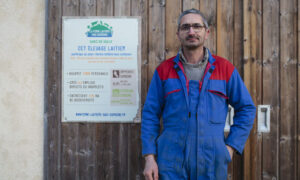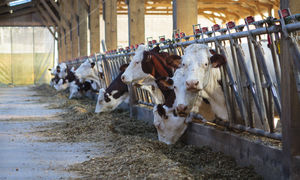Ferme laitière bas carbone : réduire l’impact climatique du lait en montagne
La Ferme laitière bas carbone vise à promouvoir des pratiques agricoles et des leviers d’action afin de réduire de 20% l’empreinte carbone du lait produit d’ici 2025. Cette démarche française est portée par le CNIEL (Centre national interprofessionnel de l’économie laitière), en partenariat avec l’Institut de l’élevage, France conseil élevage et les Chambres d’agriculture.
L’atténuation du changement climatique dans la filière lait
Diagnostic climatique et plan d’action
La Ferme laitière bas carbone consiste à réaliser dans chaque élevage un diagnostic environnemental et technico-économique et à identifier les leviers d’action potentiels permettant d’améliorer son empreinte carbone. L’objectif est de construire une stratégie de progression en collaboration avec l’éleveur, afin que le plan d’action corresponde aux réalités de sa ferme et de son contexte économique et social.
La première étape proposée dans cette démarche consiste en une sensibilisation et prise de conscience de l’impact environnemental d’une ferme laitière, grâce à un outil d’auto-évaluation permettant à chaque éleveur d’estimer par lui-même son empreinte carbone.
Une visite individuelle chez l’éleveur par un conseiller formé permet dans un second temps d’évaluer plus précisément cette empreinte et d’identifier les actions possibles. L’outil CAP’2ER® (développé initialement par l’Institut de l’Elevage dans le cadre du projet Life Carbon Dairy) permet d’estimer l’impact de l’élevage sur le climat : les émissions de gaz à effet de serre de l’élevage, ses consommations d’énergie, mais aussi sa contribution positive à la biodiversité, sa capacité nourricière (nombre de personnes nourries par l’élevage) et son stockage de carbone. Il existe deux niveaux pour cet outil CAP’2ER® : le niveau 1 collecte 27 données pour évaluer un atelier (lait ou viande) afin de sensibiliser et faire un suivi. Le niveau 2 comprend et collecte quant à lui 150 données avec des résults à l’échelle de toute la ferme, permettant la mise en place d’un vrai plan d’action pour la réduction des émissions. (Voir la liste des organismes en mesure de faire un diagnostic CAP’2ER®).
Bénéfices durables des actions portées dans les élevages
Suite au diagnostic, des actions sont envisagées selon la réalité et les contraintes de chaque élevage. Ces actions, imaginées avec l’éleveur, peuvent par exemple consister à revoir la gestion des effluents, réduire les intrants ou encore améliorer la consommation énergétique de la ferme.
En Auvergne-Rhône-Alpes, le GAEC de la Croix Pomiers rassemble 85 Montbéliardes et mène des actions pour accroître l’autonomie alimentaire de l’élevage par la mise en place du pâturage tournant, en augmentant la part des légumineuses, avec des impacts certains pour la réduction des intrants. Toujours dans cette région, le GAEC de Sully a réussi à réduire de 33% les apports en engrais et à augmenter son autonomie alimentaire en cultivant la luzerne et la chicorée. Voir les témoignages.
L’objectif premier de Ferme laitière bas carbone est de soutenir les éleveurs dans la réduction de leur impact sur le climat. Toutefois, les bénéfices environnementaux ne sont pas les seuls à émerger de ces actions : la valorisation du pâturage ou encore la réduction des intrants ont également des répercussions économiques pour la ferme. Selon les données collectées dans le cadre de la démarche, les 10% des fermes dont les émissions de gaz à effet de serre sont les plus faibles présentent en moyenne une marge brute supérieure de 10€ aux 1 000 litres de lait produits. La durabilité socio-économique et environnementale de la démarche constitue ainsi une véritable solution « gagnant-gagnant » pour l’éleveur et le climat.
Aujourd’hui, plus de 11.000 éleveurs sont engagés dans cette démarche et 1000 conseillers sont formés.
Ressources
L’initiative prend son origine dans le projet Life Carbon Dairy (2013-2018) lancé par L’Institut de l’Elevage en partenariat avec le CNIEL, France Conseil Elevage et les Chambres d’agriculture. Ce projet pilote vise à réduire de 20% les émissions de gaz à effet de serre de 3.900 exploitations laitières réparties dans six régions, à sensibiliser les éleveurs et former plus de 100 conseillers et éleveurs sur les émissions de gaz à effet de serre et à identifier les pratiques mises en œuvre par les élevages “bas-carbone”.
Le projet pilote s’avérant être un succès, il est étendu à tout le territoire français : c’est le lancement en 2015 de la Ferme laitière bas carbone – récompensée la même année lors du concours “My Positive Impact” de la Fondation Nicolas Hulot.
Aujourd’hui, dans le cadre de Ferme Laitière Bas Carbone, le CNIEL et les CRIEL financent des diagnostics avec des Conseils Régionaux (Centre Val de Loire, Pays de la Loire, Auvergne-Rhône Alpes, Nouvelle Aquitaine). De plus certaines laiteries engagées dans la démarche soutiennent les éleveurs qu’elles collectent.


L’adaptation au changement climatique dans la production laitière
La production agricole et le changement climatique sont des enjeux intrinsèquement liés de manière que les deux s’influencent mutuellement. En montagne, les effets du changement climatique sur la production laitière ont été étudiés par le CNIEL dans le programme CLIMALAIT (2015-2019).
Avec l’appui de divers partenaires tels que l’Institut de l’Elevage, l’INRAe, les Chambres d’Agriculture, Météo France, Arvalis et BTPL, le programme CLIMALAIT visait à étudier l’évolution future du climat au cours du siècle, ainsi que son impact sur les exploitations laitières. Il a permis, sur une vingtaine de zones laitières réparties sur le territoire national, d’identifier de manière collective des leviers d’adaptation au changement climatique.
Parmi les études menées, celle réalisée dans les seconds plateaux du Jura a démontré l’impact certain du changement climatique sur la production laitière. Dans cette région de moyenne montagne, l’élevage laitier est la principale activité agricole, avec notamment une forte production d’Appellation d’Origine Protégée. Alors que ces plateaux de moyenne montagne se caractérisent ordinairement par des températures froides et des précipitations élevées, l’étude menée constatait déjà l’augmentation des températures dans la région, surtout en été. Couplé à une relative diminution des précipitations, ces phénomènes climatiques contribuent à l’apparition de sécheresses estivales plus fréquentes et à réduire la production d’herbe en été.
Face à ce constat, le groupe d’éleveurs qui a été mobilisé pour l’étude dans les seconds plateaux du Jura a identifié plusieurs pistes pour s’adapter aux effets du changement climatique : constituer des stocks de foin pour les années plus sèches, cultiver des céréales pour gagner en autonomie sur la ferme, cultiver de la luzerne qui se montre être une ressource fourragère plus adaptée aux aléas climatiques, ou encore élever plus de vaches moins productives et ainsi réduire les intrants.
Certaines solutions mises en avant dans le cadre de CLIMALAIT comme leviers d’adaptation au changement climatique sont également utilisées dans le cadre de la démarche ‘Ferme Laitière Bas Carbone’ comme actions permettant de réduire l’impact climatique de la production laitière. Autonomie alimentaire et réduction des intrants, entre autres, peuvent donc être des leviers à la fois d’adaptation et de l’atténuation du changement climatique en montagne.